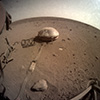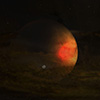MOXIE experiment reliably produces oxygen on Mars
 Day and night, and across seasons, the instrument generates breathable oxygen from the Red Planet's thin atmosphere.
Day and night, and across seasons, the instrument generates breathable oxygen from the Red Planet's thin atmosphere.
Sep 1st, 2022
Read more
 Subscribe to our Space Exploration News feed
Subscribe to our Space Exploration News feed
 Day and night, and across seasons, the instrument generates breathable oxygen from the Red Planet's thin atmosphere.
Day and night, and across seasons, the instrument generates breathable oxygen from the Red Planet's thin atmosphere.
Sep 1st, 2022
Read more Merging galaxies may hurl away the gas that fuels new stars, according to a discovery by astronomers.
Merging galaxies may hurl away the gas that fuels new stars, according to a discovery by astronomers.
Sep 1st, 2022
Read more Simple simulation accidentally leads to X-shaped galaxy for first time.
Simple simulation accidentally leads to X-shaped galaxy for first time.
Aug 29th, 2022
Read more Geological discoveries hint at conditions when life arose on Earth - and possibly on Mars.
Geological discoveries hint at conditions when life arose on Earth - and possibly on Mars.
Aug 26th, 2022
Read more An international team of researchers has announced the discovery of TOI-1452 b, an exoplanet orbiting one of two small stars in a binary system located in the Draco constellation about 100 light-years from Earth.
An international team of researchers has announced the discovery of TOI-1452 b, an exoplanet orbiting one of two small stars in a binary system located in the Draco constellation about 100 light-years from Earth.
Aug 24th, 2022
Read more While scientists have no evidence that wormholes actually exist in our world, they're good tools to help astrophysicists think about space and time. They may also answer age-old questions about what the universe looks like.
While scientists have no evidence that wormholes actually exist in our world, they're good tools to help astrophysicists think about space and time. They may also answer age-old questions about what the universe looks like.
Aug 22nd, 2022
Read more The oscillations in binary neutron stars before they merge could have big implications for the insights scientists can glean from gravitational wave detection.
The oscillations in binary neutron stars before they merge could have big implications for the insights scientists can glean from gravitational wave detection.
Aug 19th, 2022
Read more Groundbreaking observation from Gemini Observatory suggests this and possibly other colossal stars are less massive than previously thought.
Groundbreaking observation from Gemini Observatory suggests this and possibly other colossal stars are less massive than previously thought.
Aug 19th, 2022
Read more Astrophysicists lay out a method for how to use pairs of colliding black holes to measure how fast our universe is expanding - and thus understand how the universe evolved, what it is made out of, and where it's going.
Astrophysicists lay out a method for how to use pairs of colliding black holes to measure how fast our universe is expanding - and thus understand how the universe evolved, what it is made out of, and where it's going.
Aug 17th, 2022
Read more A mathematical model developed by space medicine experts could be used to predict whether an astronaut can safely travel to Mars and fulfil their mission duties upon stepping foot on the Red Planet.
A mathematical model developed by space medicine experts could be used to predict whether an astronaut can safely travel to Mars and fulfil their mission duties upon stepping foot on the Red Planet.
Aug 17th, 2022
Read more A rare find - a 'warm Neptune' around a bright blue star - offers clues to the dearth of Hot Neptunes.
A rare find - a 'warm Neptune' around a bright blue star - offers clues to the dearth of Hot Neptunes.
Aug 12th, 2022
Read more New observations of the red supergiant suggest that the 2019 mass ejection of its atmosphere might significantly affects its fate.
New observations of the red supergiant suggest that the 2019 mass ejection of its atmosphere might significantly affects its fate.
Aug 11th, 2022
Read more A new analysis of seismic data from NASA's Mars InSight mission has revealed a couple of surprises.
A new analysis of seismic data from NASA's Mars InSight mission has revealed a couple of surprises.
Aug 11th, 2022
Read more Researchers report findings that show that the Moon inherited the indigenous noble gases of helium and neon from Earth's mantle. The discovery adds to the already strong constraints on the currently favoured 'Giant Impact' theory that hypothesizes the Moon was formed by a massive collision between Earth and another celestial body.
Researchers report findings that show that the Moon inherited the indigenous noble gases of helium and neon from Earth's mantle. The discovery adds to the already strong constraints on the currently favoured 'Giant Impact' theory that hypothesizes the Moon was formed by a massive collision between Earth and another celestial body.
Aug 11th, 2022
Read more New Space-BACN effort will enable communication between low orbiting satellites - both with each other and their partners on the ground.
New Space-BACN effort will enable communication between low orbiting satellites - both with each other and their partners on the ground.
Aug 10th, 2022
Read more Some cosmological models propose that the universe expands and contracts in infinite cycles, but new research finds a crucial flaw in the latest version of this theory.
Some cosmological models propose that the universe expands and contracts in infinite cycles, but new research finds a crucial flaw in the latest version of this theory.
Aug 9th, 2022
Read more Scientists studying planet formation have made the first-ever detection of gas in a circumplanetary disk. What's more, the detection also suggests the presence of a very young exoplanet.
Scientists studying planet formation have made the first-ever detection of gas in a circumplanetary disk. What's more, the detection also suggests the presence of a very young exoplanet.
Aug 9th, 2022
Read more According to the standard model of cosmology, the vast majority of galaxies are surrounded by a halo of dark matter particles. This halo is invisible, but its mass exerts a strong gravitational pull on galaxies in the vicinity. A new study challenges this view of the Universe.
According to the standard model of cosmology, the vast majority of galaxies are surrounded by a halo of dark matter particles. This halo is invisible, but its mass exerts a strong gravitational pull on galaxies in the vicinity. A new study challenges this view of the Universe.
Aug 5th, 2022
Read more